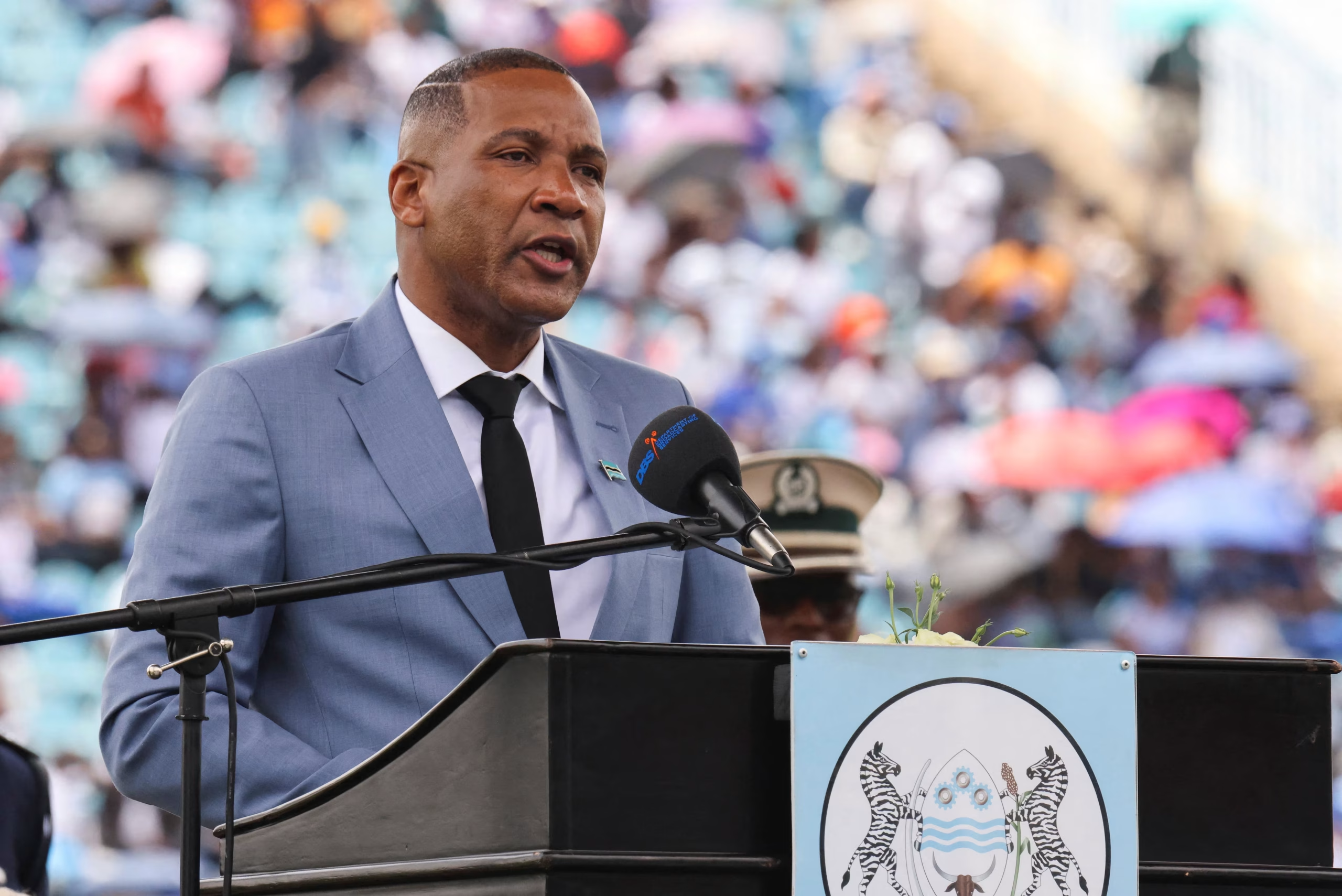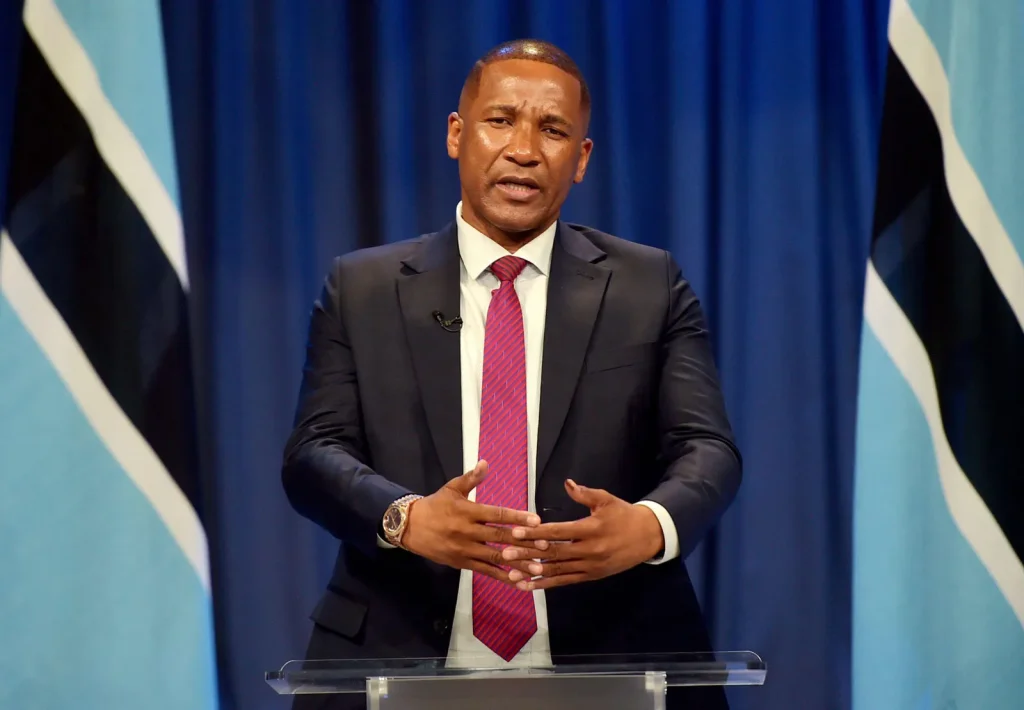“Tenders are weaved, and trust me, I have seen it myself. If a tender is advertised, people are already in place and have won it beforehand,” he said.
Botswana President Says No To Tenders

Botswana President Duma Boko is charting a bold new course for the nation’s development, calling for the abolition of the traditional tender system in favour of more agile and transparent project delivery.
Boko argues that to achieve Botswana’s ambitious vision of a resilient, diversified economy with world-class infrastructure, robust social services, and sustainable environmental stewardship, the country must break away fromoutdated procurement practices that have long hindered progress.
A Vision for Transformation
Boko’s strategy centres on economic diversification beyond diamonds, the backbone of Botswana’s economy for decades. With global diamond prices falling due to competition from lab-grown alternatives, he is actively promoting new industries such as cannabis (including medicinal marijuana) and solar power.
Agriculture is also a priority, with plans to boost production, improve livestock yields, and expand horticulture. Infrastructure modernization is another cornerstone, including the Southern African Trade Corridor, the Transla Rail Project, and climate-resilient roads and railways to replace ageing colonial-era networks.
International partnerships such as leveraging the Tanger Med Port and collaborating with Panama are aimed at enhancingBotswana’s role in regional and global trade.
RELATED: ECOWAS 50 Years: A Deeper Battle Against Money Laundering Demands Continental Urgency
On the social front, Boko envisions doubling the minimum wage, expanding social benefits for workers, mothers, and seniors, and empowering youth through digital innovation. He has also pledged to build Africa’s best healthcare system, overhaul supply chains, and ensure government facilities are fully equipped. Environmental conservation and modernization of the Botswana Defence Force round out his agenda.
Rejecting the Tender System
Despite these ambitious plans, Boko’s approach to project delivery has sparked controversy. Since taking office, he has been vocal about his intention to move away from the tender process, favouring direct appointments to speed up implementation and reduce corruption.
Speaking at a Kgotla meeting in Tlokweng, Boko recounted his experience as a legal practitioner, revealing how tenders are often manipulated by insiders and plagued by corruption.

“Tenders are weaved, and trust me, I have seen it myself. If a tender is advertised, people are already in place and have won it beforehand,” he said. He dismissed the notion that tenders are fair or transparent, describing them as “thievery disguised as lawful.”
Boko has received criticism for his direct appointment approach, but he remains steadfast. “When a tender comes out, it has already been awarded, and others are just runners-up. You will buy tender documents at a high price when the tender awardees already know they have won,” he argued.
Exploring Alternative Models
To address the pitfalls of the tender system, Boko has expressed interest in alternative procurement models, such as the Swiss challenge. This approach involves inviting unsolicited bids and then challenging other top firms in the sector to submit competing proposals.
RELATED: European Football Breaks Revenue Records, but Challenges Loom Behind the Scenes
The best offer is selected, and the original bidder is given a chance to match or improve upon it. Boko believes this model encourages competition, transparency, and speed, ensuring that projects are delivered efficiently and in the public interest.
“These are not people we know or even care about. We care about our interests and that the projects get delivered. And we evaluate, we examine thoroughly. We deploy our own expertise to check and satisfy ourselves that this is the best proposition in these circumstances,” he explained.
Tender Corruption: A Continental Challenge
Boko’s scepticism of tenders is echoed across Africa, where procurement corruption is a systemic issue. Common problems include rampant bribery, collusion, lack of transparency, political interference, low competition, and inflated pricing. Experts have called for reforms such as:
- Greater transparency and open data to expose irregularities
- E-procurement systems to reduce human discretion and increase competition
- Merit-based and value-for-money approaches in awarding contracts
- Decentralized procurement to limit opportunities for corruption
- Stronger enforcement and legal frameworks
- Multi-stakeholder oversight involving civil society and the media
- Capacity building for procurement officials
- Strict conflict-of-interest rules
- Innovative models like the Swiss challenge to maintain competition and transparency
By rejecting the tender system and seeking new approaches, President Boko aims to position Botswana as a model of integrity, efficiency, and inclusive growth in Africa’s evolving economic landscape.
Subscribe to Our Newsletter
Keep in touch with our news & offers
Thank you for subscribing to the newsletter.
Oops. Something went wrong. Please try again later.











